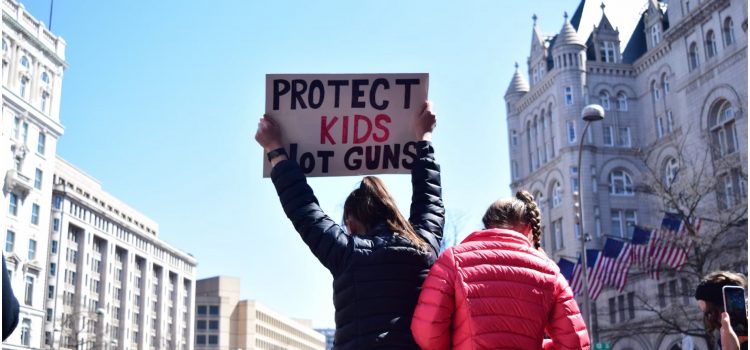
This is a free excerpt from one of Shortform’s Articles. We give you all the important information you need to know about current events and more.
Don't miss out on the whole story. Sign up for a free trial here .
What are the main points in the gun control debate in the U.S.? Why are background checks central to the conflict?
Since 1993, all firearms dealers have been required to consult the National Instant Criminal Background Check System (NICS) to verify that a prospective customer is legally eligible to own firearms before the sale. However, there are differing points of view on the flaws within the NICS system.
Read on to learn the five main problems with the NICS and how gun control and rights advocates respond.
The U.S. Gun Control Debate
Some might argue that, despite its limitations, the National Instant Criminal Background Check System (NICS) works well overall for gun control in the U.S. After all, between 1993 and 2021, NICS processed over 400 million checks and prevented about two million sales to people who didn’t pass their background checks. In the gun control debate, some people consider NICS’s flaws significant, but opinions are divided about how to fix them.
Here we’ll briefly consider how gun control advocates and gun rights advocates respectively propose to address the five main flaws of the background check system.
#1: Incomplete Data
The NICS is only as good as the data that’s in the system, so the first problem in the gun control debate is that the data in the system is not always complete. NICS only records data that would prohibit a person from owning firearms, so incomplete data could result in inappropriate approval of a firearm purchase.
Gun Control Perspective: Give the federal government authority to compel state and local agencies to input convictions, mental health diagnoses, and any other relevant data into the NICS system, rather than trusting them to do it voluntarily. Then periodically audit the agencies inputting the data to make sure they’re not missing anything.
Gun Rights Perspective: Repeal the requirement for firearms dealers to conduct NICS background checks. Incomplete data makes the NICS less effective, reducing its value to the public. But even if the completeness of the data could be improved by expanding the federal government’s authority to audit agencies that supply data to NICS, the improvement would likely be minimal and would incur significant cost in terms of administrative overhead. As such, it’s better just to abandon the system than to throw a lot of money into trying to fix it.
#2: Incorrect Data
Another issue addressed in the gun control debate is that the data that does get entered into NICS isn’t completely accurate. This data is sometimes misinterpreted when running a background check. The system sometimes denies a sale just because the prospective gun buyer’s name gets confused with the name of someone who would be prohibited from owning firearms. When a sale is denied even though the buyer is actually eligible to own firearms, it’s called a “false positive.”
Gun Control Perspective: As with the problem of incomplete data, increase the federal government’s scrutiny of the data that gets entered into the NICS. Omissions are the most important errors to catch, because they allow prohibited gun sales to slip through, but increased scrutiny would catch and correct other errors as well.
Gun Rights Perspective: More so than data that is merely incomplete, this is a reason to repeal the background check requirement, because errors that result in false positives prevent law-abiding citizens from exercising their right to own firearms.
#3: The Three-Day Limit
Under the NICS, a gun may occasionally be sold before the background check is complete. Specific to the gun control debate, federal law stipulates that if an NICS background check isn’t completed within three business days, the firearms dealer is allowed to sell the gun without waiting for the results of the check.
Gun Control Perspective: Repeal the law that allows firearm sales to proceed by default if the background check isn’t completed within three days. Instead, give the government as much time as they need to conduct a thorough background check, and do not allow the sale to proceed unless the background check concludes that the buyer is eligible to own firearms.
Gun Rights Perspective: Ideally, repeal the NICS background check requirement—then the three-day limit would be eliminated by default. However, as long as the background check requirement remains in place, the three-day limit is not a problem, but rather a solution. Specifically, it mitigates the risk of a person’s right to own a gun being suspended arbitrarily (and perhaps indefinitely) just because the government hasn’t gotten around to processing his background check.
#4: Private Sales—Internet & Gun Show Loopholes
Some say that the internet enables anyone to buy a gun without a background check, because it enables private-party buyers and sellers anywhere in the world to contact each other and arrange a private sale. In principle, there is some truth to this, but in practice, buying a gun online isn’t that easy.
This is because most of the guns sold via the internet have to be shipped to the purchaser. But unless the purchaser is a licensed dealer, they can’t be shipped directly. Instead, the seller ships the gun to a firearms dealer, where the buyer then picks it up. The dealer has to conduct an NICS background check on the buyer before letting him pick up the gun. So most internet gun sales are still subject to background checks.
In principle, a person looking to sell a gun and a person who wants to buy it could arrange a private sale through the internet, but to complete the sale legally, they would have to meet in person to complete the purchase, and they would both have to live in the same state, so that the gun wouldn’t have to be shipped or transported across a state line. And if the buyer showed any indication of mental problems or criminal intent, then the seller could face criminal charges just for making the sale.
Similarly, some sources in the gun control debate assume that gun shows involve large numbers of private gun sales and thus provide an easy means for criminals to avoid background checks. But the reality is that most firearm sales at gun shows do involve a background check.
Anyone who wants to set up a table at a gun show and deal in firearms at the show has to be federally licensed to deal in firearms. At the gun show, the dealers conduct business exactly the same way that they conduct business in their respective storefronts, including conducting NICS background checks.A criminal looking to obtain a firearm by exploiting the “gun show loophole” would have to approach other customers at the gun show and convince one of them to make a private sale. And he would have to do so without arousing suspicion over the fact that he wants to buy a gun, but he’s avoiding all the licensed dealers who are there to sell guns.
Gun Control Perspective: Prohibit private firearm sales. Require all firearm sales to go through a federally licensed dealer so that all sales will require a background check. This is sometimes referred to as the “universal background checks” mandate.
Gun Rights Perspective: Eliminate the background check requirement for all sales. Then private sales will be no exception. As it currently stands, private sales offer an important remedy for people who are eligible to own guns (and, in some cases, may urgently need a gun for self-defense) but cannot purchase one from a regular dealer. This could happen either because of a false-positive error in the NICS, or in a situation where dealers weren’t open for business. During the COVID-19 pandemic, for example, firearms dealers in some states remained closed for extended periods.
#5: Illicit Sales
In the gun control debate, it’s important to recognize that illicit arms dealers who intentionally sell weapons to criminals clearly don’t conduct background checks. Some sources estimate that over 70% of criminals obtain firearms from illicit sources. Illicit dealers, in turn, get their guns either by stealing them or through “straw purchases.”
A “straw purchase” is when a person buys a gun (and undergoes a background check) on behalf of someone else. Typically, an illicit arms dealer will recruit a number of people who have clean records to buy guns for him from licensed dealers. In most cases, the straw purchasers know (or have reason to suspect) that the person they’re buying guns for can’t legally buy them himself. And if they’re doing it for money, then they’re breaking the law by “doing business” in firearms without a license. But making a straw purchase is itself a federal crime, regardless of whether the purchaser knows that the person she’s buying guns for is prohibited from owning them, and regardless of whether or not she’s making a profit (interestingly, illegal arms dealers recruit mostly women to act as straw purchasers).
Gun Control Perspective: Supporters of gun control advise making it harder for anyone to buy a gun. If you can reduce the total number of guns sold in the United States, that will reduce the number of guns that make their way onto the black market. This would require restrictions beyond the background check requirement. For example, limiting the number of guns that a person can buy at once, or in a given year, would reduce the number of guns that straw purchasers could acquire.
Gun Rights Perspective: In the gun control debate, gun rights advocates say that illicit sales illustrate why background checks—and gun control laws in general—are ultimately ineffective: Most criminals already get their guns through illegal means, so making more laws to further restrict firearms would have no effect on criminals. We should focus on bringing criminals to justice, not on trying to restrict access to guns. Furthermore, the risk of being shot while burglarizing a home or committing some other crime can provide a psychological deterrent to prospective criminals. This risk increases the more people own guns and are willing to use them in self-defense. So one way to prevent crime is to make it easier for average people to purchase firearms and obtain defensive training.

Want to fast-track your learning? With Shortform, you’ll gain insights you won't find anywhere else .
Here's what you’ll get when you sign up for Shortform :
- Complicated ideas explained in simple and concise ways
- Smart analysis that connects what you’re reading to other key concepts
- Writing with zero fluff because we know how important your time is






